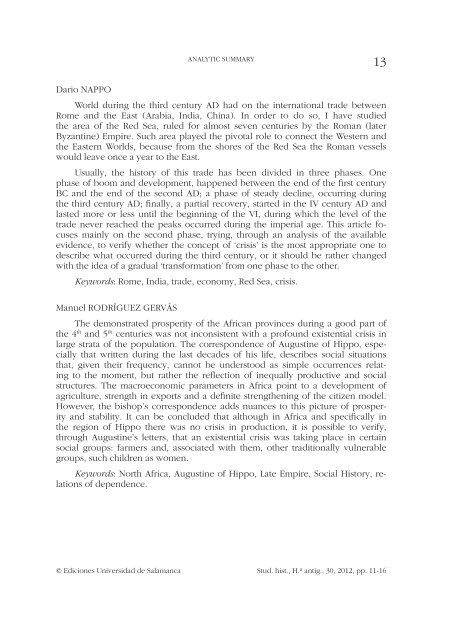Lucio Emilio Paulo y el derecho de guerra - Occidens
Lucio Emilio Paulo y el derecho de guerra - Occidens
Lucio Emilio Paulo y el derecho de guerra - Occidens
Create successful ePaper yourself
Turn your PDF publications into a flip-book with our unique Google optimized e-Paper software.
Dario NAPPO<br />
ANALYTIC SUMMARY<br />
© Ediciones Universidad <strong>de</strong> Salamanca Stud. hist., H.ª antig., 30, 2012, pp. 11-16<br />
13<br />
World during the third century AD had on the international tra<strong>de</strong> between<br />
Rome and the East (Arabia, India, China). In or<strong>de</strong>r to do so, I have studied<br />
the area of the Red Sea, ruled for almost seven centuries by the Roman (later<br />
Byzantine) Empire. Such area played the pivotal role to connect the Western and<br />
the Eastern Worlds, because from the shores of the Red Sea the Roman vess<strong>el</strong>s<br />
would leave once a year to the East.<br />
Usually, the history of this tra<strong>de</strong> has been divi<strong>de</strong>d in three phases. One<br />
phase of boom and <strong>de</strong>v<strong>el</strong>opment, happened between the end of the first century<br />
BC and the end of the second AD; a phase of steady <strong>de</strong>cline, occurring during<br />
the third century AD; finally, a partial recovery, started in the IV century AD and<br />
lasted more or less until the beginning of the VI, during which the lev<strong>el</strong> of the<br />
tra<strong>de</strong> never reached the peaks occurred during the imperial age. This article focuses<br />
mainly on the second phase, trying, through an analysis of the available<br />
evi<strong>de</strong>nce, to verify whether the concept of ‘crisis’ is the most appropriate one to<br />
<strong>de</strong>scribe what occurred during the third century, or it should be rather changed<br />
with the i<strong>de</strong>a of a gradual ‘transformation’ from one phase to the other.<br />
Keywords: Rome, India, tra<strong>de</strong>, economy, Red Sea, crisis.<br />
Manu<strong>el</strong> RODRÍGUEZ GERVÁS<br />
The <strong>de</strong>monstrated prosperity of the African provinces during a good part of<br />
the 4th and 5th centuries was not inconsistent with a profound existential crisis in<br />
large strata of the population. The correspon<strong>de</strong>nce of Augustine of Hippo, especially<br />
that written during the last <strong>de</strong>ca<strong>de</strong>s of his life, <strong>de</strong>scribes social situations<br />
that, given their frequency, cannot be un<strong>de</strong>rstood as simple occurrences r<strong>el</strong>ating<br />
to the moment, but rather the reflection of inequally productive and social<br />
structures. The macroeconomic parameters in Africa point to a <strong>de</strong>v<strong>el</strong>opment of<br />
agriculture, strength in exports and a <strong>de</strong>finite strengthening of the citizen mod<strong>el</strong>.<br />
However, the bishop’s correspon<strong>de</strong>nce adds nuances to this picture of prosperity<br />
and stability. It can be conclu<strong>de</strong>d that although in Africa and specifically in<br />
the region of Hippo there was no crisis in production, it is possible to verify,<br />
through Augustine’s letters, that an existential crisis was taking place in certain<br />
social groups: farmers and, associated with them, other traditionally vulnerable<br />
groups, such children as women.<br />
Keywords: North Africa, Augustine of Hippo, Late Empire, Social History, r<strong>el</strong>ations<br />
of <strong>de</strong>pen<strong>de</strong>nce.


